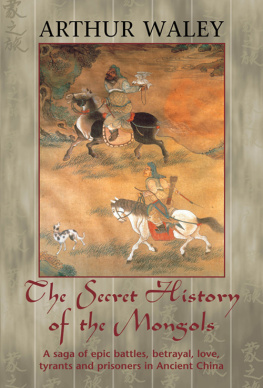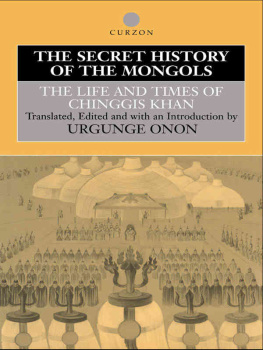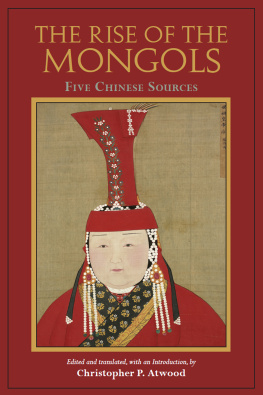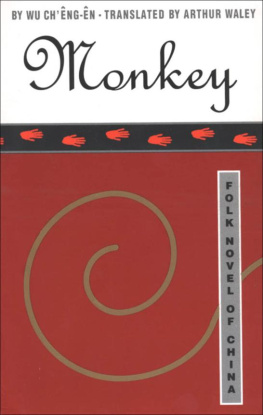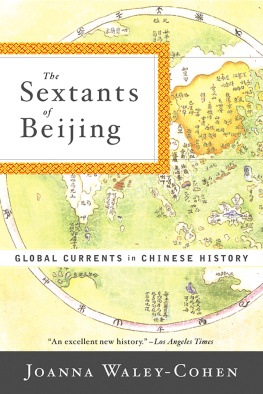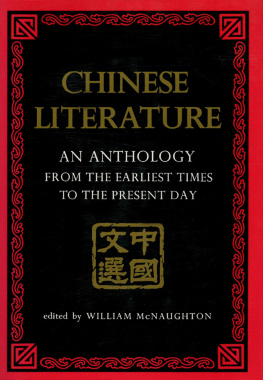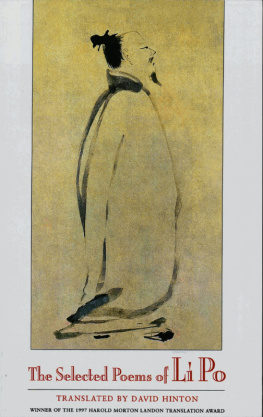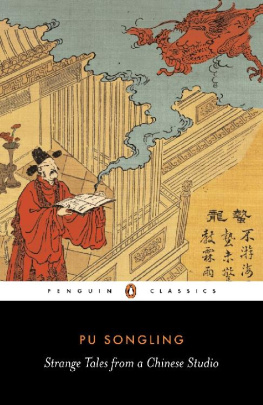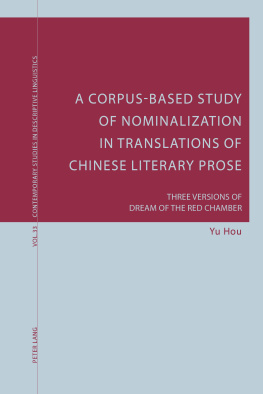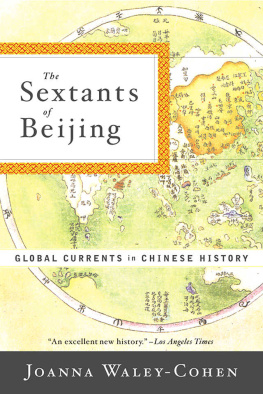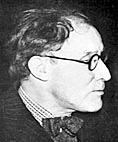Copyright & Information
The
Secret History of the Mongols
and Other Pieces
This edition first published in 2002
Copyright: John Robinson; House of Stratus 2002-2010
All rights reserved. No part of this publication may be reproduced, stored in a retrieval system, or transmitted, in any form, or by any means (electronic, mechanical, photocopying, recording, or otherwise), without the prior permission of the publisher. Any person who does any unauthorised act in relation to this publication may be liable to criminal prosecution and civil claims for damages.
The right of Arthur Waley to be identified as the author of this work has been asserted.
Electronic edition published in 2010 by House of Stratus, an imprint of
Stratus Books Ltd., Lisandra House, Fore St., Looe,
Cornwall, PL13 1AD, UK.
Typeset by House of Stratus.
A catalogue record for this book is available from the British Library and the Library of Congress.
| EAN | ISBN | Edition |
| 0755116046 | 9780755116041 | Print |
| 0755122771 | 9780755122776 | Pdf |
| 0755119428 | 9780755119424 | Mobi |
| 0755122763 | 9780755122769 | Epub |
www.houseofstratus.com
Publishers Note
Regretfully, some reading devices will not show some extended Latin characters correctly, and may substitute a ?, or another character, in their place. There are very few such characters in this text and the few substitutions are extremely unlikely to detract from its enjoyment.
About the Author
Arthur Waley was born Arthur Edward Schloss at Tunbridge Wells, England in 1889, the second son of progressive middle class parents who were forced some twenty five years later to change the family name because of anti-German sentiment at the time of the 1st World War. The name adopted was that of his maternal grandfather, who had been a prominent Jewish academic and founder member of the Anglo-Jewish Association. Other members of the family had previously distinguished themselves in various ways, including Waleys elder brother who rose to be second-secretary at the Treasury.
At an early age, Arthur showed both interest and promise in the arts. He attended Rugby School before going up to Kings College, Cambridge on an open scholarship to read classics. However, problems with his eyesight forced him to abandon what might have been a flourishing academic career at Cambridge before he had completed his tripos. Whilst at Cambridge lifelong held political views were honed; he attended a Fabian Society summer school hosted by Beatrice Webb and met many future Bloomsbury Group figures including Virginia Woolf, Roger Fry, and Lytton Strachey. Later, he was to become an active member of the Group and also wrote a number of well regarded articles for the New Statesman.
After Cambridge, he travelled for a year, learning Spanish along the way with much the same ease as he had French and German a couple of years before. Through an acquaintanceship with Oswald Sickert at the Encyclopaedia Britannica he obtained an introduction to Lawrence Binyon at the British Museum, where there was a vacancy in the Print Room. Waley passed the necessary exam and was employed for a spell assisting Binyon before the nature of his job changed and he ended up indexing the museums vast collection of Japanese and Chinese paintings. This entailed him learning Japanese and Chinese which was achieved without formal instruction of any kind.
He started to translate Chinese poetry and introduced them to his wide circle of friends, including T.S. Eliot. Publication was a different matter, however, as there was perceived to be no market. Eventually, following a review of Tang poetry he provided to the journal of the School for Oriental Studies, a hesitant publisher was persuaded to market Waleys first book in 1918; A Hundred and Seventy Chinese Poems . It remained in print for forty years and was read by many people who would not otherwise have thought themselves capable of appreciating poetry of any kind. More Chinese poetry followed, along with his first Japanese translations.
After the war, there was a burgeoning literary movement in England, particularly amongst those surrounding the Bloomsbury set. E Bruce Brooks writes of Waleys role:
The postwar twenties quickly developed into the age of Joyce, Eliot, and Pound; of T E Lawrence, Wyndham Lewis, and Lytton Strachey; of the Bloomsbury group. It was equally the age of Arnold Bennett and Somerset Maugham. At all its levels, the British literary scene thus included a substantial element of reaching toward the exotic, of going beyond the classical West to the classical East. Waley was already acquainted with many of the English literary figures, and in this milieu, he himself became a literary personality: the man who, without leaving home, had nevertheless penetrated to the mysteries of the East, and could bring back with him something exotic, and yet intelligible to the interested and literate Englander. Literarily and socially, he expanded into this role.
Upon leaving the British Museum in 1929, Waley once again travelled on the continent before turning to writing full time. Perhaps his most famous translation, the novel Monkey , was published in 1942, but only after many other popular and sought after works. At the beginning of the Second World War, ii was realised that Waley was one of the few people in England who could read Japanese, and so he was conscripted to work as a censor for the Ministry of Information. There, he acquired a reputation for criticising the grammar and writing of the authors whose pieces he was translating and decoding.
Undoubtedly, he had by this time built a considerable scholastic reputation and eventually Cambridge recognised this, and their loss, when he was made an honorary fellow of his old College in 1945. Honorary Doctorates from both Aberdeen and Oxford followed, along with national awards culminating in him being made a Companion of Honour in 1956. He was elected to the British Academy in 1945.
Until her death in 1962, his constant companion had been Beryl de Zoete. Thereafter he moved to Highgate to be looked after by Alison Robinson, a widow and old friend, whom he married shortly before his death in 1966.
One of the most remarkable facts about Waley, given his widely acknowledged and admired expertise, was that despite many invitations he never visited the far east. His interest was centred on the past and he was not particularly concerned with contemporary Chinese and Japanese societies.
Writing in the Oxford Dictionary of National Biography, Basil Gray states that:
For Waley the work of a translator was made to the measure of his own tastes and sensibilities ( I. Morris, ed., Madly Singing in the Mountains, 1970, 158 ). He sought to make his translations works of art, aiming at literature rather than philology. In this he was successful.
Authors Preface
T his book consists in the main of articles, broadcasts and so on, later than 1952, when my last miscellany The Real Tripitaka was published, together with some earlier pieces going back as far as 1921, but not previously reprinted. I have also included one or two pieces which have never been published before, of which by far the longest is The Secret History of the Mongols , which gives its name to the book.
Of the Secret History, I have translated only the parts founded on story-tellers tales. These are some of the most vivid primitive literature that exists anywhere in the world. I have used the Chinese version, but with constant reference to the Mongol text. The Secret History (so called merely because it was meant for the Mongols and not for the Chinese, who might have got from it the impression that the Mongols were barbarians) has been chiefly studied from a learned point of view, by scholars addressing themselves only to other scholars, and its quality as literature and hence its value to ordinary readers have been to a great extent overlooked. I hope that my extracts will introduce it for the first time to many who do not have access to learned publications. It is a work which it would be possible to furnish with endless annotation. I have preferred to dispense with footnotes and give only a few indispensable explanations in brackets. A full translation by Professor Cleaves of Harvard, intended for scholars, with abundant annotation, exists and will, one hopes, soon be published.

